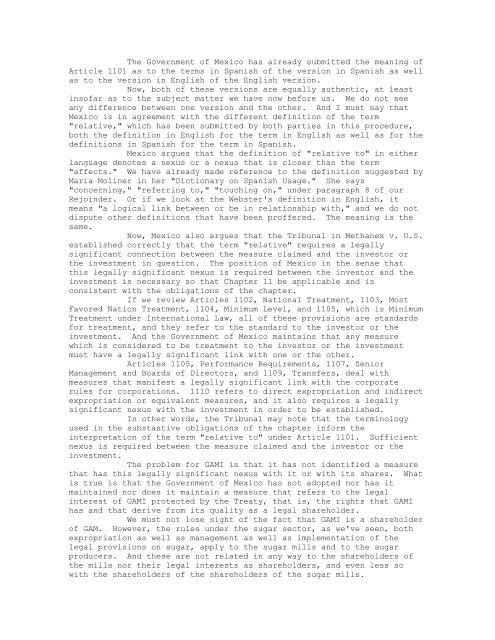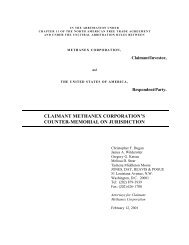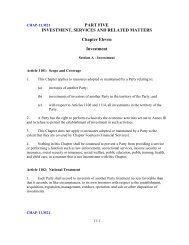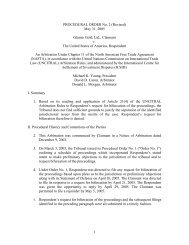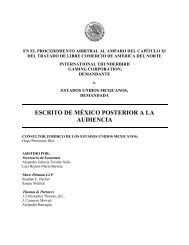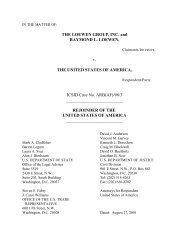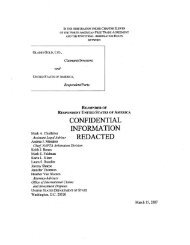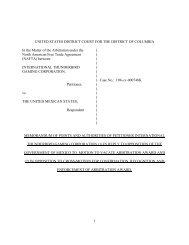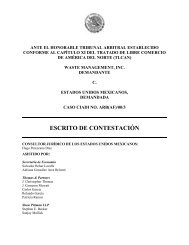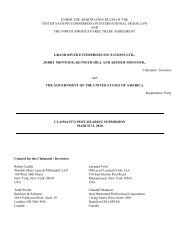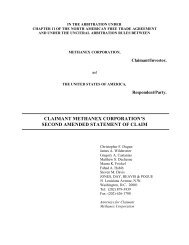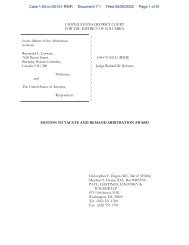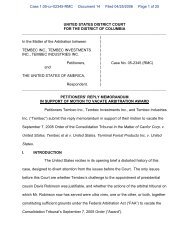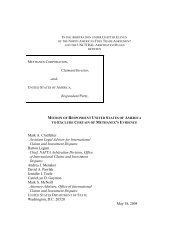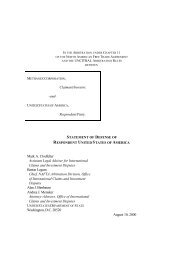GAMI INVESTMENTS, INC. - NAFTAClaims
GAMI INVESTMENTS, INC. - NAFTAClaims
GAMI INVESTMENTS, INC. - NAFTAClaims
You also want an ePaper? Increase the reach of your titles
YUMPU automatically turns print PDFs into web optimized ePapers that Google loves.
The Government of Mexico has already submitted the meaning of<br />
Article 1101 as to the terms in Spanish of the version in Spanish as well<br />
as to the version in English of the English version.<br />
Now, both of these versions are equally authentic, at least<br />
insofar as to the subject matter we have now before us. We do not see<br />
any difference between one version and the other. And I must say that<br />
Mexico is in agreement with the different definition of the term<br />
"relative," which has been submitted by both parties in this procedure,<br />
both the definition in English for the term in English as well as for the<br />
definitions in Spanish for the term in Spanish.<br />
Mexico argues that the definition of "relative to" in either<br />
language denotes a nexus or a nexus that is closer than the term<br />
"affects." We have already made reference to the definition suggested by<br />
Maria Moliner in her "Dictionary on Spanish Usage." She says<br />
"concerning," "referring to," "touching on," under paragraph 8 of our<br />
Rejoinder. Or if we look at the Webster's definition in English, it<br />
means "a logical link between or be in relationship with," and we do not<br />
dispute other definitions that have been proffered. The meaning is the<br />
same.<br />
Now, Mexico also argues that the Tribunal in Methanex v. U.S.<br />
established correctly that the term "relative" requires a legally<br />
significant connection between the measure claimed and the investor or<br />
the investment in question. The position of Mexico in the sense that<br />
this legally significant nexus is required between the investor and the<br />
investment is necessary so that Chapter 11 be applicable and is<br />
consistent with the obligations of the chapter.<br />
If we review Articles 1102, National Treatment, 1103, Most<br />
Favored Nation Treatment, 1104, Minimum Level, and 1105, which is Minimum<br />
Treatment under International Law, all of these provisions are standards<br />
for treatment, and they refer to the standard to the investor or the<br />
investment. And the Government of Mexico maintains that any measure<br />
which is considered to be treatment to the investor or the investment<br />
must have a legally significant link with one or the other.<br />
Articles 1105, Performance Requirements, 1107, Senior<br />
Management and Boards of Directors, and 1109, Transfers, deal with<br />
measures that manifest a legally significant link with the corporate<br />
rules for corporations. 1110 refers to direct expropriation and indirect<br />
expropriation or equivalent measures, and it also requires a legally<br />
significant nexus with the investment in order to be established.<br />
In other words, the Tribunal may note that the terminology<br />
used in the substantive obligations of the chapter inform the<br />
interpretation of the term "relative to" under Article 1101. Sufficient<br />
nexus is required between the measure claimed and the investor or the<br />
investment.<br />
The problem for <strong>GAMI</strong> is that it has not identified a measure<br />
that has this legally significant nexus with it or with its shares. What<br />
is true is that the Government of Mexico has not adopted nor has it<br />
maintained nor does it maintain a measure that refers to the legal<br />
interest of <strong>GAMI</strong> protected by the Treaty, that is, the rights that <strong>GAMI</strong><br />
has and that derive from its quality as a legal shareholder.<br />
We must not lose sight of the fact that <strong>GAMI</strong> is a shareholder<br />
of GAM. However, the rules under the sugar sector, as we've seen, both<br />
expropriation as well as management as well as implementation of the<br />
legal provisions on sugar, apply to the sugar mills and to the sugar<br />
producers. And these are not related in any way to the shareholders of<br />
the mills nor their legal interests as shareholders, and even less so<br />
with the shareholders of the shareholders of the sugar mills.


